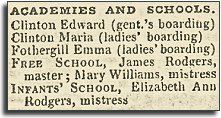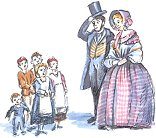 schools
which they paid for. Their daughters might have a private governess to teach
them at home.
schools
which they paid for. Their daughters might have a private governess to teach
them at home. Business people might send their children to a local private school.
In the early Victorian period there were small private schools or Academies in most towns. A list of these schools in Crickhowell, is shown here.
|
There
were National and British
schools set up in many communities in Powys. Sometimes there was
rivalry between the two. See the Presteigne
Schools pages for an example of this.
|
